- Home
- Barbara W. Tuchman
The Proud Tower: A Portrait of the World Before the War, 1890-1914 Page 2
The Proud Tower: A Portrait of the World Before the War, 1890-1914 Read online
Page 2
Besides riches, rank, broad acres and ancient lineage, the new Government also possessed, to the regret of the Liberal Opposition and in the words of one of them, “an almost embarrassing wealth of talent and capacity.” Secure in authority, resting comfortably on their electoral majority in the House of Commons and on a permanent majority in the House of Lords, of whom four-fifths were Conservatives, they were in a position, admitted the same opponent, “of unassailable strength.”
Enriching their ranks were the Whig aristocrats who had seceded from the Liberal party in 1886 rather than accept Mr. Gladstone’s insistence on Home Rule for Ireland. They were for the most part great landowners who, like their natural brothers the Tories, regarded union with Ireland as sacrosanct. Led by the Duke of Devonshire, the Marquess of Lansdowne and Mr. Joseph Chamberlain, they had remained independent until 1895, when they joined with the Conservative party, and the two groups emerged as the Unionist party, in recognition of the policy that had brought them together. With the exception of Mr. Chamberlain, this coalition represented that class in whose blood, training and practice over the centuries, landowning and governing had been inseparable. Ever since Saxon chieftains met to advise the King in the first national assembly, the landowners of England had been sending members to Parliament and performing the duties of High Sheriff, Justice of the Peace and Lord Lieutenant of the Militia in their own counties. They had learned the practice of government from the possession of great estates, and they undertook to manage the affairs of the nation as inevitably and unquestionably as beavers build a dam. It was their ordained role and natural task.
But it was threatened. By a rising rumble of protest from below, by the Radicals of the Opposition who talked about taxing unearned increment on land, by Home Rulers who wanted to detach the Irish island from which so much English income came, by Trade Unionists who talked of Labour representation in Parliament and demanded the legal right to strike and otherwise interfere with the free play of economic forces, by Socialists who wanted to nationalize property and Anarchists who wanted to abolish it, by upstart nations and strange challenges from abroad. The rumble was distant, but it spoke with one voice that said Change, and those whose business was government could not help but hear.
Planted firmly across the path of change, operating warily, shrewdly yet with passionate conviction in defence of the existing order, was a peer who was Chancellor of Oxford University for life, had twice held the India Office, twice the Foreign Office and was now Prime Minister for the third time. He was Robert Arthur Talbot Gascoyne-Cecil, Lord Salisbury, ninth Earl and third Marquess of his line.
Lord Salisbury was both the epitome of his class and uncharacteristic of it—except insofar as the freedom to be different was a class characteristic. He was six feet four inches tall, and as a young man had been thin, ungainly, stooping and shortsighted, with hair unusually black for an Englishman. Now sixty-five, his youthful lankiness had turned to bulk, his shoulders had grown massive and more stooped than ever, and his heavy bald head with full curly gray beard rested on them as if weighted down. Melancholy, intensely intellectual, subject to sleepwalking and fits of depression which he called “nerve storms,” caustic, tactless, absent-minded, bored by society and fond of solitude, with a penetrating, skeptical, questioning mind, he had been called the Hamlet of English politics. He was above the conventions and refused to live in Downing Street. His devotion was to religion, his interest in science. In his own home he attended private chapel every morning before breakfast, and had fitted up a chemical laboratory where he conducted solitary experiments. He harnessed the river at Hatfield for an electric power plant on his estate and strung up along the old beams of his home one of England’s first electric light systems, at which his family threw cushions when the wires sparked and sputtered while they went on talking and arguing, a customary occupation of the Cecils.
Lord Salisbury cared nothing for sport and little for people. His aloofness was enhanced by shortsightedness so intense that he once failed to recognize a member of his own Cabinet, and once, his own butler. At the close of the Boer War he picked up a signed photograph of King Edward and, gazing at it pensively, remarked, “Poor Buller [referring to the Commander-in-Chief at the start of the war], what a mess he made of it.” On another occasion he was seen in prolonged military conversation with a minor peer under the impression that he was talking to Field Marshal Lord Roberts.
For the upper-class Englishman’s alter ego, most intimate companion and constant preoccupation, his horse, Lord Salisbury had no more regard. Riding was to him purely a means of locomotion to which the horse was “a necessary but extremely inconvenient adjunct.” Nor was he addicted to shooting. When Parliament rose he did not go north to slaughter grouse upon the moors or stalk deer in Scottish forests, and when protocol required his attendance upon royalty at Balmoral, he would not go for walks and “positively refused,” wrote Queen Victoria’s Private Secretary, Sir Henry Ponsonby, “to admire the prospect or the deer.” Ponsonby was told to have his room in the dismal castle kept “warm”—a minimum temperature of sixty degrees. Otherwise he retired for his holidays to France, where he owned a villa at Beaulieu on the Riviera and where he could exercise his fluent French and lose himself in The Count of Monte Cristo, the only book, he once told Dumas fils, which allowed him to forget politics.
His acquaintance with games was confined to tennis, but when elderly he invented his own form of exercise, which consisted in riding a tricycle through St. James’s Park in the early mornings or along paths cemented for the purpose in the park of his estate at Hatfield. Wearing for the occasion a kind of sombrero hat and a short sleeveless cloak with a hole in the middle in which he resembled a monk, he would be accompanied by a young coachman to push him up the hills. At the downhill slopes, the young man would be told to “jump on behind,” and the Prime Minister, with the coachman’s hands on his shoulders, would roll away, cloak flying and pedals whirring.
Hatfield, twenty miles north of London in Hertfordshire, had been the home of the Cecils for nearly three hundred years since James I had given it, in 1607, to his Prime Minister, Robert Cecil, first Earl of Salisbury, in exchange for a house of Cecil’s to which the King had taken a fancy. It was the royal residence where Queen Elizabeth had spent her childhood and where, on receiving news of her accession, she held her first council, to swear in William Cecil, Lord Burghley, as her chief Secretary of State. Its Long Gallery, with intricately carved paneled walls and gold-leaf ceiling, was 180 feet in length. The Marble Hall, named for the black and white marble floor, glowed like a jewel case with painted and gilded ceiling and Brussels tapestries. The red King James Drawing Room was hung with full-length family portraits by Romney and Reynolds and Lawrence. The library was lined from floor to gallery and ceiling with 10,000 volumes bound in leather and vellum. In other rooms were kept the Casket Letters of Mary Queen of Scots, suits of armor taken from men of the Spanish Armada, the cradle of the beheaded King, Charles I, and presentation portraits of James I and George III. Outside were yew hedges clipped in the form of crenelated battlements, and the gardens, of which Pepys wrote that he never saw “so good flowers, nor so great gooseberries as big as nutmegs.” Over the entrance hall hung flags captured at Waterloo and presented to Hatfield by the Duke of Wellington, who was a constant visitor and devoted admirer of the Prime Minister’s mother, the second Marchioness. In her honor Wellington wore the hunt coat of the Hatfield Hounds when he was on campaign. The first Marchioness was painted by Sir Joshua Reynolds and hunted till the day she died at eighty-five, when, half-blind and strapped to the saddle, she was accompanied by a groom who would shout, when her horse approached a fence, “Jump, dammit, my Lady, jump!”
It was this exceptional person who reinvigorated the Cecil blood, which, after Burghley and his son, had produced no further examples of superior mentality. Rather, the general mediocrity of succeeding generations had been varied only, according to a later Cecil, by instances of “quit
e exceptional stupidity.” But the second Marquess proved a vigorous and able man with a strong sense of public duty who served in several mid-century Tory cabinets. His second son, another Robert Cecil, was the Prime Minister of 1895. He in turn produced five sons who were to distinguish themselves. One became a general, one a bishop, one a minister of state, one M.P. for Oxford, and one, through service to the government, won a peerage in his own right. “In human beings as in horses,” Lord Birkenhead was moved to comment on the Cecil record, “there is something to be said for the hereditary principle.”
At Oxford in 1850 the contemporaries of young Robert Cecil agreed that he would end as Prime Minister either because or in spite of his remorselessly uncompromising opinions. Throughout life he never bothered to restrain them. His youthful speeches were remarkable for their virulence and insolence; he was not, said Disraeli, “a man who measures his phrases.” A “Salisbury” became a synonym for a political imprudence. He once compared the Irish in their incapacity for self-government to Hottentots and spoke of an Indian candidate for Parliament as “that black man.” In the opinion of Lord Morley his speeches were always a pleasure to read because “they were sure to contain one blazing indiscretion which it is a delight to remember.” Whether these were altogether accidental is open to question, for though Lord Salisbury delivered his speeches without notes, they were worked out in his head beforehand and emerged clear and perfect in sentence structure. In that time the art of oratory was considered part of the equipment of a statesman and anyone reading from a written speech would have been regarded as pitiable. When Lord Salisbury spoke, “every sentence,” said a fellow member, “seemed as essential, as articulate, as vital to the argument as the members of his body to an athlete.”
Appearing in public before an audience about whom he cared nothing, Salisbury was awkward; but in the Upper House, where he addressed his equals, he was perfectly and strikingly at home. He spoke sonorously, with an occasional change of tone to icy mockery or withering sarcasm. When a recently ennobled Whig took the floor to lecture the House of Lords in high-flown and solemn Whig sentiments, Salisbury asked a neighbor who the speaker was and on hearing the whispered identification, replied perfectly audibly, “I thought he was dead.” When he listened to others he could become easily bored, revealed by a telltale wagging of his leg which seemed to one observer to be saying, “When will all this be over?” Or sometimes, raising his heels off the floor, he would set up a sustained quivering of his knees and legs which could last for half an hour at a time. At home, when made restless by visitors, it shook the floor and made the furniture rattle, and in the House his colleagues on the front bench complained it made them seasick. If his legs were at rest his long fingers would be in motion, incessantly twisting and turning a paper knife or beating a tattoo on his knee or on the arm of his chair.
He never dined out and rarely entertained beyond one or two political receptions at his town house in Arlington Street and an occasional garden party at Hatfield. He avoided the Carlton, official club of the Conservatives, in favor of the Junior Carlton, where a special luncheon table was set aside for him alone and the library was hung with huge placards inscribed SILENCE. He worked from breakfast to one in the morning, returning to his desk after dinner as if he were beginning a new day. His clothes were drab and often untidy. He wore trousers and waistcoat of a dismal gray under a broadcloth frock coat grown shiny. But though careless in dress, he was particular about the trimming of his beard and carefully directed operations in the barber’s chair, indicating “just a little more off here” while “artist and subject gazed fixedly in the mirror to judge the result.”
Despite his rough tongue and sarcasms, Salisbury exerted a personal charm upon close colleagues and equals which, as one of them said, “was no small asset in the conduct of affairs.” He gave detailed attention to party affairs and even sacrificed his exclusiveness for their sake. Once he astonished everyone by accepting an invitation to the traditional dinner for party supporters given by the Leader of the House of Commons. He asked to be given in advance biographical details about each guest. At the dinner the Prime Minister charmed his neighbor at table, a well-known agriculturist, with his expert knowledge of crop rotation and stock-breeding, chatted amiably afterward with every guest in turn, and before leaving, beckoned to his Private Secretary, saying, “I think I have done them all, but there was someone I have not identified who, you said, made mustard.”
Mr. Gladstone, though in political philosophy his bitterest antagonist, acknowledged him “a great gentleman in private society.” In private life he was delightful and sympathetic and a complete contrast to his public self. In public acclaim, Salisbury was uninterested, for—since the populace was uninstructed—its opinions, as far as he was concerned, were worthless. He ignored the public and neither possessed nor tried to cultivate the personal touch that makes a political leader a recognizable personality to the man in the street and earns him a nickname like “Pam” or “Dizzy” or the “Grand Old Man.” Not in the press, not even in Punch, was Lord Salisbury ever called anything but Lord Salisbury. He made no attempt to conceal his dislike for mobs of all kinds, “not excluding the House of Commons.” After moving to the Lords, he never returned to the Commons to listen to its debates from the Peers’ Gallery or chat with members in the Lobby, and if compelled to allude to them in his own House, would use a tone of airy contempt, to the amusement of visitors from the Commons who came to hear him. But this was merely an outward pose designed to underline his deep inner sense of the patrician. He was not rank-conscious; he was indifferent to honors or any other form of recognition. It was simply that as a Cecil, and a superior one, he was born with a consciousness in his bones and brain cells of ability to rule and saw no reason to make any concessions of this prescriptive right to anyone whatever.
Having entered the House of Commons in the customary manner for peers’ sons, from a family-controlled borough in an uncontested election at the age of twenty-three, and, during his fifteen years in the House of Commons, having been returned unopposed five times from the same borough, and having for the last twenty-seven years sat in the House of Lords, he had little personal experience of vote-getting. He regarded himself not as responsible to the people but as responsible for them. They were in his care. What reverence he felt for anyone was directed not down but up—to the monarchy. He revered Queen Victoria, who was some ten years his senior, both as her subject and, with chivalry toward her womanhood, as a man. For her he softened his brusqueness even if at Balmoral he could not conceal his boredom.
She in turn visited him at Hatfield and had the greatest confidence in him, giving him, as she told Bishop Carpenter, “if not the highest, an equal place with the highest among her ministers,” not excepting Disraeli. Salisbury, who was “bad on his legs at any time,” was the only man she ever asked to sit down. Unalike in every quality of mind except in their strong sense of rulership, the tiny old Queen and the tall, heavy, aging Prime Minister felt for each other mutual respect and regard.
In unimportant matters of state as in dress, Salisbury was inclined to be casual. Once when two clergymen with similar names were candidates for a vacant bishopric, he appointed the one not recommended by the Archbishop of Canterbury, and this being sorrowfully drawn to his attention, he said, “Oh, I daresay he will do just as well.” He reserved high seriousness for serious matters only, and the most serious to him was the maintenance of aristocratic influence and executive power, not for its own sake, but because he believed it to be the only element capable of holding the nation united against the rising forces of democracy which he saw “splitting it into a bundle of unfriendly and distrustful fragments.”
Class war and irreligion were to him the greatest evils and for this reason he detested Socialism, less for its menace to property than for its preaching of class war and its basis in materialism, which meant to him a denial of spiritual values. He did not deny the need of social reforms, but believed they co
uld be achieved through the interplay and mutual pressures of existing parties. The Workmen’s Compensation Act, for one, making employers liable for work-sustained injuries, though denounced by some of his party as interference with private enterprise, was introduced and passed with his support in 1897.
He fought all proposals designed to increase the political power of the masses. When still a younger son, and not expecting to succeed to the title, he had formulated his political philosophy in a series of some thirty articles which were published in the Quarterly Review in the early 1860’s, when he was in his thirties. Against the growing demand at that time for a new Reform law to extend the suffrage, Lord Robert Cecil, as he then was, had declared it to be the business of the Conservative party to preserve the rights and privileges of the propertied class as the “single bulwark” against the weight of numbers. To extend the suffrage would be, as he saw it, to give the working classes not merely a voice in Parliament but a preponderating one that would give to “mere numbers a power they ought not to have.” He deplored the Liberals’ adulation of the working class “as if they were different from other Englishmen” when in fact the only difference was that they had less education and property and “in proportion as the property is small the danger of misusing the franchise is great.” He believed the workings of democracy to be dangerous to liberty, for under democracy “passion is not the exception but the rule” and it was “perfectly impossible” to commend a farsighted passionless policy to “men whose minds are unused to thought and undisciplined to study.” To widen the suffrage among the poor while increasing taxes upon the rich would end, he wrote, in a complete divorce of power from responsibility; “the rich would pay all the taxes and the poor make all the laws.”

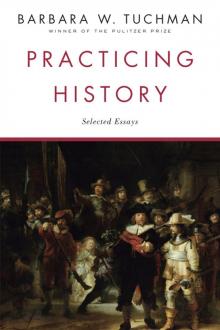 Practicing History: Selected Essays
Practicing History: Selected Essays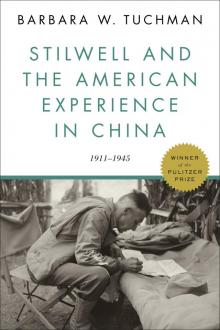 Stilwell and the American Experience in China, 1911-45
Stilwell and the American Experience in China, 1911-45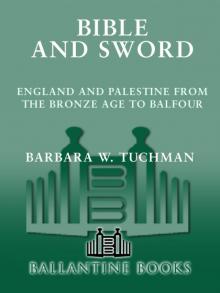 Bible and Sword: England and Palestine From the Bronze Age to Balfour
Bible and Sword: England and Palestine From the Bronze Age to Balfour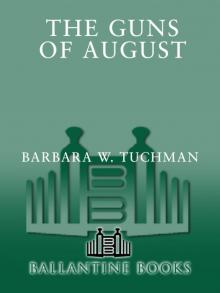 The Guns of August
The Guns of August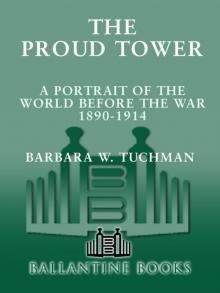 The Proud Tower: A Portrait of the World Before the War, 1890-1914
The Proud Tower: A Portrait of the World Before the War, 1890-1914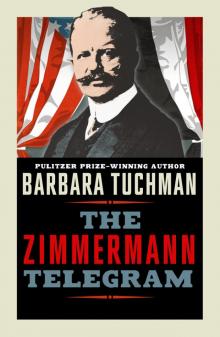 The Zimmermann Telegram
The Zimmermann Telegram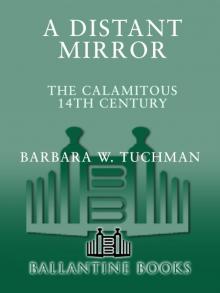 A Distant Mirror: The Calamitous 14th Century
A Distant Mirror: The Calamitous 14th Century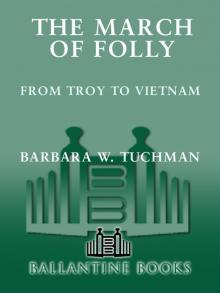 The March of Folly: From Troy to Vietnam
The March of Folly: From Troy to Vietnam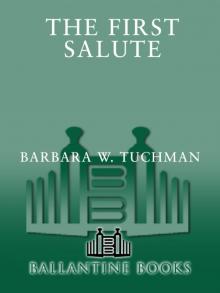 The First Salute
The First Salute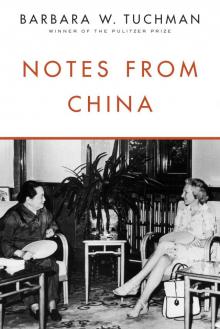 Notes From China
Notes From China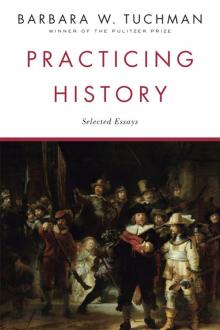 Practicing History
Practicing History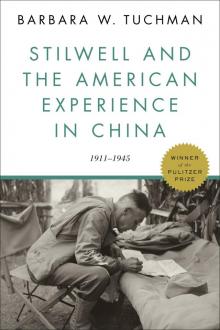 Stilwell and the American Experience in China
Stilwell and the American Experience in China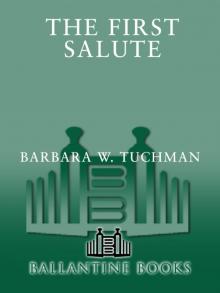 First Salute
First Salute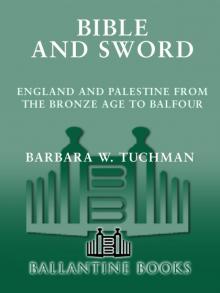 Bible and Sword
Bible and Sword